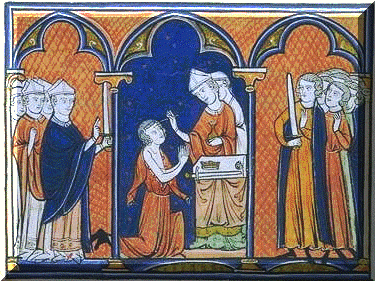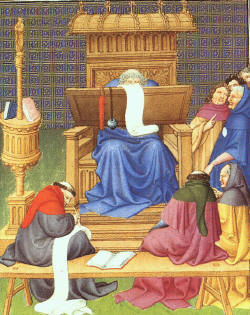Dig.4.8.1
Paulus 2 ad edictum: Compromissum ad similitudinem iudiciorum redigitur et ad finiendas lites pertinet (A compromise is similar to a judgment in court, and it establishes the end of a dispute).
A
quibus iudicibus prouocari non licet.
A iudicibus, quos communis consensus elegerit,
non liceat prouocari.
(Dictum Gratiani).
Quod
de arbitris
intelligendum est.
Iudicum enim alii sunt arbitrarii, alii sunt
ordinarii. Ordinarii uero sunt, qui ab
apostolico, ut ecclesiastici, uel ab imperatore,
utpote seculares, legitimam potestatem
accipiunt. Arbitrarii sunt, qui nullam
potestatem habentes, cum consensu litigantium in
iudices eliguntur, in quos conpromittitur, ut
eorum sententiae stetur
(Some judges are
arbiters and others are ordinary. Ordinary judges receive their
authority from the pope, as ecclesiastical judges, or from the emperor, as
secular judges. Arbiters have no power, but with the consent of the
litigants are elected to be judges, in whom the litigants compromise that
their judgments will stand).
Horum
alii sunt ordinarii et arbitrarii, <qui
in legibus arbitrii delegati censentur
add. Sg> alii
arbitrarii tantum. Ordinarii et arbitrarii sunt,
qui legitimam potestatem habentes ab eis
eliguntur ad arbitrandum, qui non sunt suae
ditioni subpositi (Arbiters
are either ordinary and arbiters or only arbiters. Ordinary arbiters
are those who have legitmate power and are elected by those who are not
subject to their jurisdiction).
Ab
his, etsi ut arbitrarii sedeant, et non ut ordinarii, priuilegio
tamen ordinariae dignitatis, grauatus
aliquis appellare ualebit (Someone
who is oppressed can appeal from those who sit as arbiters but do not sit
as ordinary judges, but who have the privilege of the ordinary dignity).
April 3, 1164, Fallavecchia (Near Milan)
Die veneris qui est tertius dies mensis aprilis, de indictione duodecima. Cum disscordia æssæt inter donum (dominum recte) Bertramum, abbatem monasterii de Morimondo, et altera parte homines illos de loco Besate , nomina quorum infrascripta sunt, que discordia fuit deposita terminandam Malleaxevero de Besate et Oprando Bracco, arbitris ex utraque parte electis.
On Friday, 3 April, in the twelfth indiction since there was discord between Lord Bertram, abbot of the monastery of Morimondo and the men of the village of Besate, arbiters Malleaxevero of Besate and Oprando Bracco were elected by both sides to settle the dispute.
Le carte del monastero di S. Maria di Morimondo I (1010-1170), a cura di Michele Ansani (Spoleto 1992) n. 208
Nos magister Rubertus Gaietanus et Ugo quondam Rolandi arbitri electi a domino Ubaldo Pisano archiepiscopo et a venerabili abbate Sextense Attone de ecclesia sancti Salvatoris ad diffiniendas lites et controversias que inter eos erant tam per legem Romanam quam et per bonum usum qui legi non adversetur, et questiones feodi inter eos secundum usum feodi ad penam libra ccc. stipulatione ad invicem promissa, litem que inter eos vertebatur sic diffiniunt (We, Rubertus Gaietanus and Hugh, the son of Roland, elected arbiters by Lord Ubaldus, archbishop of Pisa and the venerabile abbot Sextenus Atto of the church of the Holy Savior to render judgment in a dispute that has arisen between them by Roman law and by good custom which is not contrary to law, and questions of feudal law by feudal custom, each of them stipulated 300 pounds. We render the following judgment).
Regesta Chartarum Italiae, edited Natale Caturegli (Rome 1938 XVI) n. 525, p. 368
Book 1, title 43 (De arbitris), chapter 1
Ex concilio Africano
Arbitri sunt in dispari numero assumendi, et, eis discordantibus, statur sententiae maioris partis (An odd number of arbiters should always be elected, and when they disagree, the majority's judgment shall prevail)
Sane . . . Si autem ex communi placito episcoporum, inter quos causa versatur, arbitros elegerint, aut unus eligatur aut tres, ut, si tres elegerint, aut omnium sequantur sententiam, aut duorum (If bishops elect arbiters by common agreement for a case in which they have a dispute, whether they elect one or three, if three, they must follow the judgment of all three or two).
Book 1, title 43 (De arbitris), chapter 4
In mulierem singularem tanquam in arbitratricem compromitti non potest; secus si mulier habet alias iurisdictionem de iure communi vel consuetudine. Nam tunc etiam super rebus temporalibus ecclesiae potest in eam valide compromitti. (Normally a woman alone may not be elected an arbiter. However, if a woman has exercised jurisdiction according the the Ius commune and custom, she may. For they she can be legitimately elected an arbiter in cases dealing with the temporal goods of the Church)
Innocentius III. Cancellario et Magistro Lothario Canonico Parisiensi.
Beloved sons the abbot and convent of Scarduna of the Cisterian order showed us their complaint that arose between them and the Hospitalers of Ceresiers in the diocese of Sens over the use of a certain forest in Oscha, called Fagetum, in the valley of Morini, in which our beloved daughter in Christ, A. Queen of France was elected arbitrator. She heard all the evidence and understood the issues completely. She also had the counsel of several bishops and other learned men. She promulgated a definitive judgment that was redacted into her own writing and that of the bishops, who were present. The signed the judgment with their seals.
The Hospitaliers did not fear to contest her judgment. Although according to the rule of the ius civile women should not exercise this kind of public office . . . because, nevertheless, approved custom, which is considered lex, in Gallic lands these sorts of excellent women are known to exercise ordinary jurisdiction . . . we command by Apostolic decree that you warn and induce the Hospitalers to observe this decision of the Queen . . .
Dilecti filii abbas et conventus de Scarduna Cisterciensis ordinis sua nobis querela monstrarunt, quod, cum inter eos ex una parte, ac dilectos filios Hospitalarios de Ceresiers Senonensis dioecesis ex altera super usuario cuiusdam nemoris in Oscha, quod dicitur Fagetum, et territorio vallis Morini quaestio verteretur, in carissimam in Christo filiam A. reginam Francorum illustrem fuit compromissum utrinque, quae, auditis hinc inde propositis, et causae meritis plenius intellectis, de plurimorum episcoporum et aliorum virorum prudentum consilio arbitrium duxit per diffinitivam sententiam promulgandum, † et redactum in scripto proprio et episcoporum, qui interfuerunt, fecit firmari sigillis; contra cuius sententiam Hospitalarii temere venire non timent. Quamvis autem secundum regulam iuris civilis feminae a huiusmodi publicis officiis sint remotae, et alibi dicatur, quod, licet summae opinionis et optime constitutae exsistant, si arbitrium in se susceperint, vel si patronae inter libertos suos interposuerint audientiam, ab omni sint iudiciali examine separandae, ut ex earum prolatione nulla poena adversus iustos earum comtemptores, nullaque pacti exceptio habeatur; quia tamen iuxta consuetudinem approbatam, quae pro lege servatur, in partibus Gallicanis huiusmodi feminae praecellentes in subditos suos ordinariam iurisdictionem habere noscuntur, discretioni vestrae per apostolica scripta mandamus, quatenus praefatos Hospitalarios, ut arbitrium ipsum, praesertim cum episcoporum fuerit praesentia et consilio roboratum, sicut sine pravitate provide latum est, et ab utraque parte sponte receptum, observent, monere ac inducere procuretis, eos ad hoc, si necesse fuerit, per poenam in compromisso statutam appellatione postposita compellatis. [ Testes autem etc. Dat. Lat. II. Non. Nov. Pont. nostr. Ao. V. 1202.]

